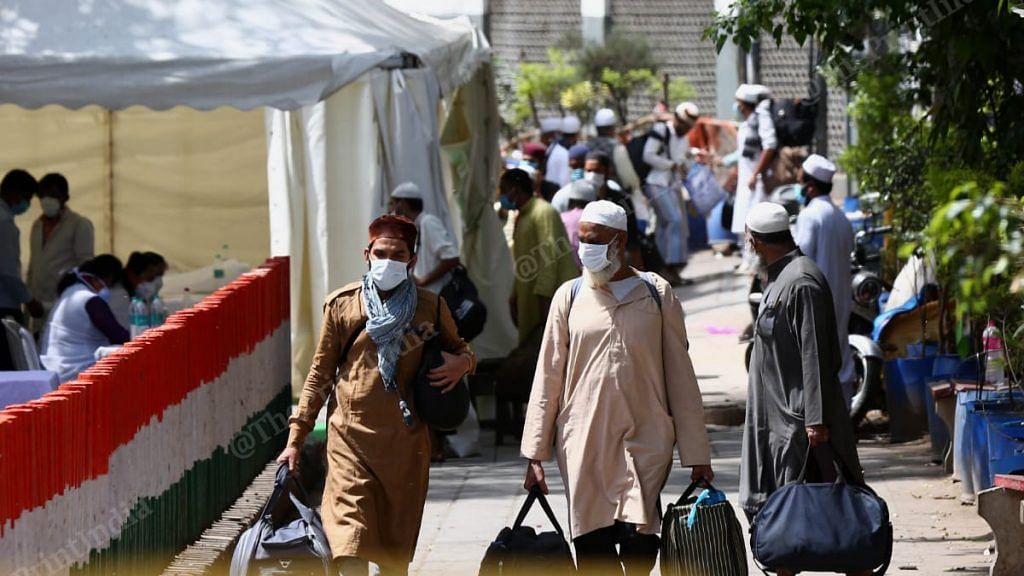New Delhi: Non-resident Indians across the Hindu and Muslim communities in the US have condemned an “escalation of Islamophobia” in India in the wake of several Covid-19 cases among participants of Islamic missionary movement Tablighi Jamaat’s event last month in the national capital.
US-based organisations, the Indian American Muslim Council (IAMC) and Hindus For Human Rights (HfHR), issued a joint statement Saturday to criticise the “horrifying levels of vitriol poured on Muslims by several media outlets and some public figures” that has resulted in an increase in alleged assaults on the community.
“In parts of the country the social and economic boycott of Muslims is being openly pursued as a response to a healthcare and humanitarian crisis that requires a unified response from the entire populace,” the statement said, appealing for a rejection of “hate politics”.
It added that Islamophobia has “risen exponentially” in the country since reports came that some members of the Tablighi Jamaat had met at an annual conference at Delhi’s Nizamuddin Markaz in mid-March and later tested positive for the novel coronavirus.
While the Narendra Modi government had carried out an intense contact tracing exercise and large-scale tests for the event participants, some sections have fanned communal passions over this. Public figures, including BJP leader from Karnataka Shobha Karandlaje, who referred to the Tablighi event as “Corona Jihad”, also communalised the incident.
The IAMC describes itself as an advocacy group “dedicated to safeguarding India’s pluralist and tolerant ethos”. The HfHR advocates for “an inclusive and egalitarian Hinduism”.
Also read: RSS says Tablighi Jamaat conduct not reflection on all Muslims, they’re aiding govt in fight
‘Publicly condemn falsehoods about Muslims’
In their joint statement, IAMC and HfHR pointed out that the Tablighi Jamaat conference took place before the lockdown “when it was business as usual for the entire country”, adding that at the time, India hadn’t begun social distancing.
The statement quoted Union health secretary Lav Agarwal saying on 13 March that the coronavirus outbreak is “not a health emergency” while cautioning against panic.
“It was at least four days after the conference ended that Prime Minister Narendra Modi announced a daylong curfew for March 22. Air travel and trains halted only that day. Mr. Modi’s announcement of a 21-day lockdown came even later, on March 24,” it said.
It quoted IAMC president Ahsan Khan to call the Covid-19 crisis exploitation “shameful”. “The absurdity of the idea that Muslims of a specific group are working to spread the deadly disease is matched only by the brazenness with which it is being vocalized by some politicians and influential media anchors,” Khan said in the statement.
HfHR co-founder Sunita Viswanath urged the Modi government to “publicly condemn this falsehood about Muslims”.
Also read: Call it a mistake, not conspiracy against India, say Muslim scholars on Tablighi Jamaat event
Other places of worship
The IAMC and HfHR statement said people who believe the “canard of devious Muslims” working to spread the disease must ask themselves why Home Minister Amit Shah was the chief guest at an AIIMS convocation in Rishikesh on 14 March, the first day of the two-day Tablighi event.
“They must also ask why places of worship across India were open for days after the two-day Tablighi event ended on March 15. The Saibaba temple at Shirdi city in Maharashtra and the Venkateswara Temple at Tirupati city in Andhra Pradesh, each averaging over 50,000 pilgrims a day, closed only on March 17 and 19, respectively,” it said.
On 17 March, the Uttar Pradesh government insisted it would go ahead with the 10-day Ramnavami celebrations from 25 March through 4 April in Ayodhya, where a million Hindu pilgrims were expected, said the statement, adding that it was cancelled only on 21 March.
It also highlighted the violation of social distancing norms violations on 22 March amid Prime Minister Narendra Modi’s curfew call.
‘Slandering the Tablighi Jamaat’
The IAMC and HfHR also criticised the role of Indian media in spreading the hatred, noting that the police had to “debunk their propaganda”.
“Both IAMC and HfHR are united in their condemnation of the constant barrage of anger and hate being spouted by anchors on news channels such as Zee News, ANI and Times Now, as well as media outlets of some vernacular languages. It is a measure of the bias and irrationality that is being disseminated on these channels, that the police had to publicly debunk their propaganda on Twitter and warn them against spreading fake news,” it said.
The two US organisations called upon the Modi government to crack down on fake content making “outrageous and patently false claims about Tablighi Jamaat members misbehaving with medical staff” while in quarantine.
“Such fake content has been circulating on social media and shared by millions, not only slandering the Tablighi Jamaat and the entire Muslim community by extension, but creating a dangerous and volatile situation for millions of people,” it said.
Viswanath said the greatest ethical and civic responsibility at this time is to ensure “social distancing”, and that the poor, sick and needy are taken care of. “We must call out violations of social distancing protocols regardless of who the violators are,” she added.
Also read: How Tablighi Jamaat emerged as the ‘largest known’ Covid-19 source in South Asia
